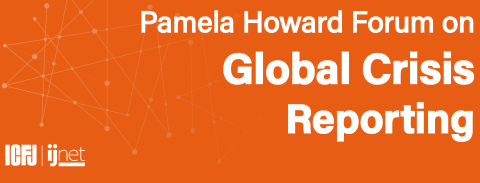
Dear Friend,
It was just about two years ago that many of us first heard of a worrisome new virus. Soon after, as this once-in-a-century pandemic took hold, ICFJ launched the Global Health Crisis Reporting Forum to help journalists cover the story of their lifetimes.
Now, with more than 13,000 journalists participating in our award-winning Forum in five languages, we are expanding this initiative beyond covering COVID-19. The journalists in our network told us they want the same benefits from our health forum – webinars with experts, training sessions on journalism tools, and collaborative reporting grants – to help them cover other vital issues in their communities. They asked for assistance in reporting on the many crises facing our world today: disinformation, rising authoritarianism, climate change, tech disruption, migration and more.
ICFJ is absolutely committed to serving our global community of journalists in the best way possible. We listened, and today, we are responding. We are renaming our effort the ICFJ Pamela Howard Forum on Global Crisis Reporting, in honor of our esteemed Vice Chair, who has done so much to support ICFJ’s work. Since joining the board in 2000, Pam has done more than just about anyone to ensure ICFJ’s growth and success. She has been the indomitable chair of our annual Tribute to Journalists, a crucial strategic advisor, and a champion of ICFJ’s work far and wide.
The pandemic and global health will remain a key focus of the Forum. As the omicron variant causes yet another spike in infections, it is clear the crisis will be with us for a long time to come. But just as almost every reporter became a “health reporter” over the past two years, the global challenges ahead demand that journalists build expertise to meet future crises – crises that cross borders. The Forum is designed to help journalists do that important work, by connecting them with resources, experts and each other.
The ICFJ Pamela Howard Forum on Global Crisis Reporting launches today in four languages: English, French, Portuguese and Spanish. (Arabic is coming soon.) The amazing community managers from the health forum will steer this expanded effort, with support from the fabulous editors at ICFJ’s International Journalists’ Network (IJNet).
Our first English webinar under the expanded Forum will be held Jan. 20 and will feature leading U.S. climate change reporters: Yessenia Funes from Atmos, Steve Mufson from The Washington Post, Eric Roston from Bloomberg and Lauren Sommer from NPR. They will discuss everything from how to interpret the science to tracking government progress on climate change goals to the politics of covering this charged topic. Sign up to attend.
I can’t wait to see the great journalism that comes out of this effort, all over the world.
All the best,
Sharon Moshavi